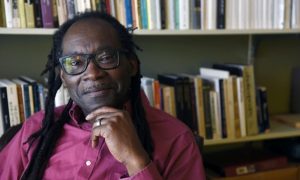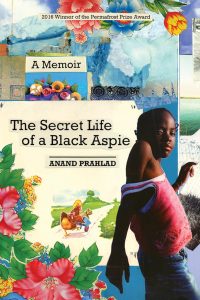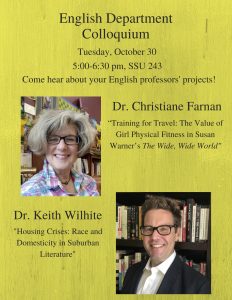Each year, the English Department hosts the Greyfriar Living Literature Series in which they invite a distinguished literary writer to hold a workshop, discuss writing, and read from their work. This year’s Greyfriar author was Anand Prahlad, a published poet, memoirist, and professor. Prahlad visited my African American Literature class on Tuesday March 5th in the afternoon before his lecture and shared some of his insights on writing with our class. 
As part of our assignment for the day, my professor, Dr. Wilhite, assigned selected passages from Prahlad’s 2017 memoir, The Secret Life of a Black Aspie. His memoir discusses his experience with autism spectrum disorder and describes the way he sees the world. Prahlad kicks off his memoir with a bold statement: “Before I start telling you about my life, though, I should share with you a secret: I don’t remember most of it.” He admitted to our class that it was a line he wasn’t sure if he should keep in the memoir, but decide that there is an important, distinguished relationship between memory and life writing. “Everyone remembers differently,” Prahlad said.
Dr. Wilhite started off the class by having us read one of Prahlad’s poems, “Grind,” from his collection of poetry, As Good As Mango. The poem, written with extensive enjambment and impressionism, narrates an observer watching young black boys skateboarding in Harlem. Students discussed some of their observations from the poem, including Prahlad’s use of bright and positive imagery with darkness. Prahlad listened to student’s comments, then explained his own intentions with the poem, specifically how it was meant to capture a sense of percussive choreography. It was a great opportunity to hear an author speak about his own work. 
The class then transitioned into talking about the selected passages from Prahlad’s memoir. Students were able to ask Prahlad questions, and many of their inquiries centered around his writing style as someone diagnosed with autism spectrum disorder. “My relationship to memory is kind of rooted in sensory experiences,” he explained. Prahlad shared an anecdote about a time he was asked to describe the autistic experience in order to best understand how to work with someone with autism. “Imagine everything is alive,” he said. “Everything is an aura. Everything is vibrating.”
Hearing Prahlad speak about his memoir and poetry was a valuable opportunity as an aspiring writer and an English major. I was unfortunately unable to attend his reading and Q&A due to a class conflict, but I was fortunate to have the chance to hear him discuss his own work. If you’re interested in learning more about Prahlad and his publications, you can check out his website at https://prahladauthor.com.


